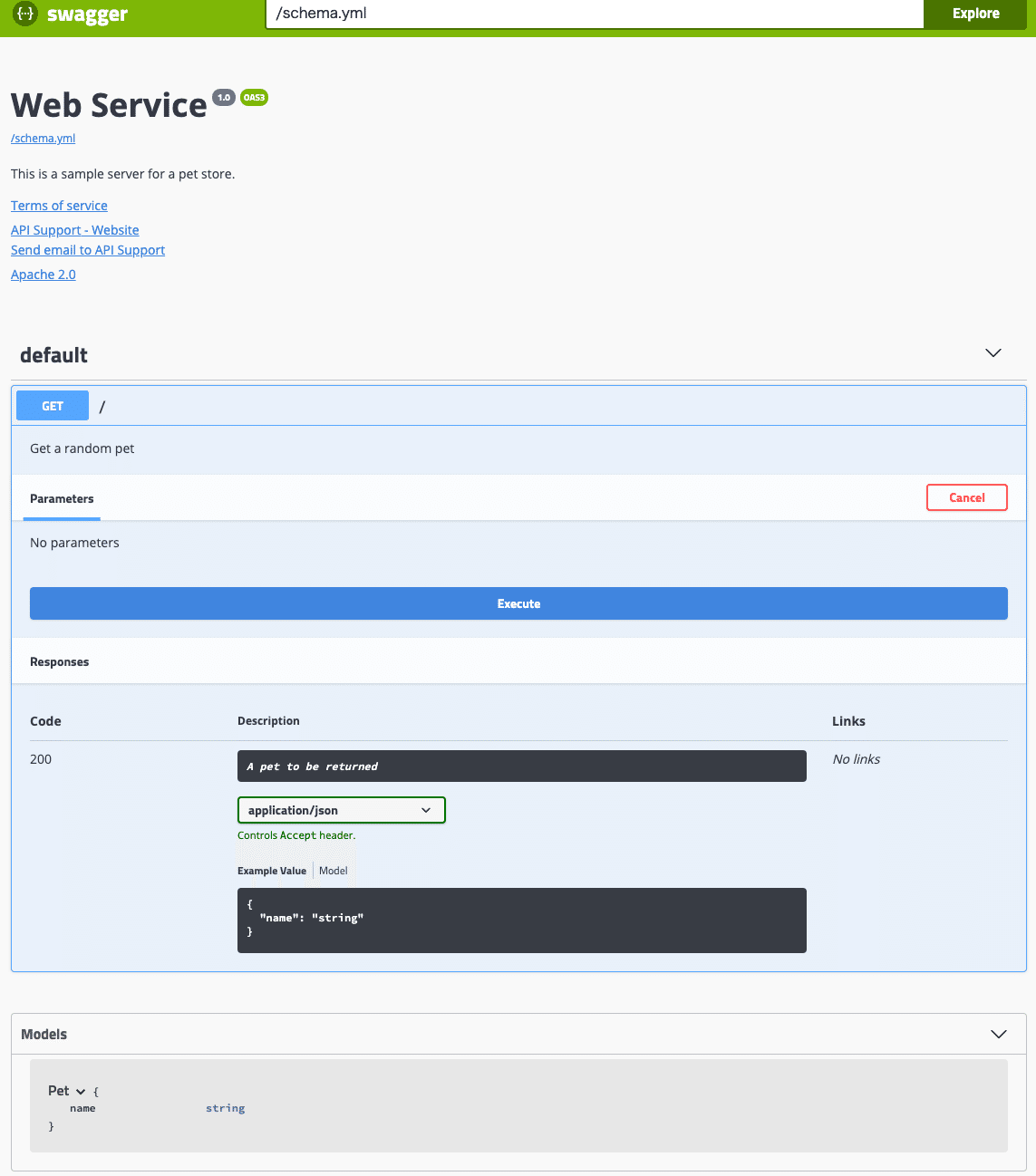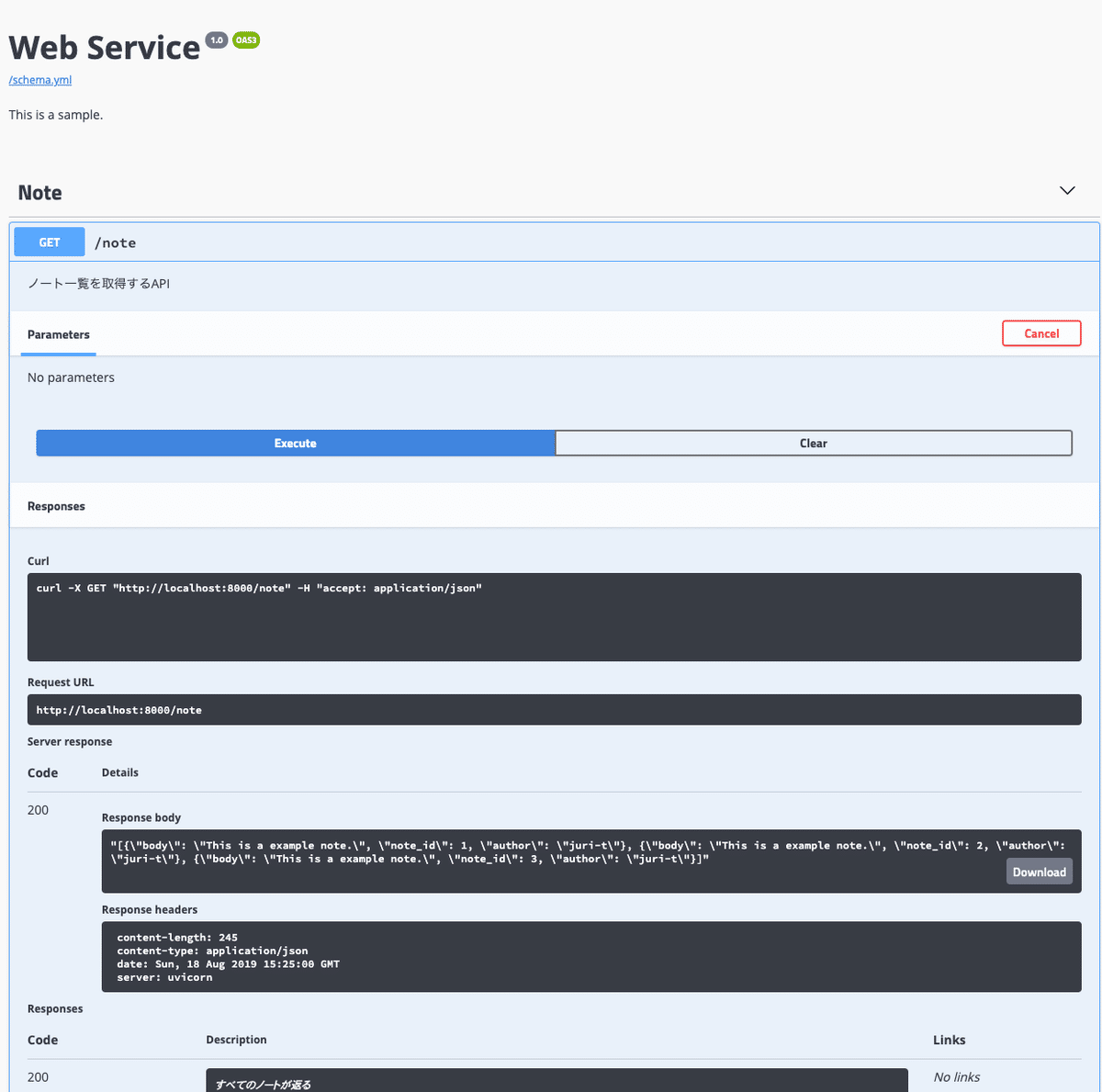responderで理解するWebサーバー #8 APIドキュメント
こんにちは、Webエンジニアのjuri-tです。
今回はAPIドキュメントについて書きたいと思います。
APIドキュメントとは?
普段私達が使っているWebサービスの中には、APIとして、外部から操作可能なエンドポイントを公開していることがあります。例えば、Google Calender。普段はWebブラウザなどで使っていると思いますが、他のWebサービスやアプリから連携できるように、APIがあります。(ちなみに私は使ったことないです)
さて、Google Calendarのように自分のWebサービスもAPIを公開しよう!となったときに一つ考えることがあります。そうです。APIのドキュメントです。ドキュメントがないと、APIを公開しても使い方や利用規約などがよくわからず、使いたくても使えない状態になります。
これらを自分でカスタマイズして作るのも手ではありますが、開発者全員が好き勝手作ると、フォーマットがバラバラで読みにくいし、作るのにも時間がかかるなどデメリットも多いのでOpenAPI SpecificationというRESTful APIに関する仕様があります。
仮に一般公開はしない社内サーバーだとしても、他部署のエンジニアと共同で仕事をする際はドキュメントがないよりはあったほうがお互い認識の齟齬が起こりづらく円滑に進みやすいと思います。
前置きが長くなりましたが、responderではこれが簡単に出来るようになっているようです。
ドキュメントに沿って実行してみる
何はともあれ、responderで紹介している通りにやってみます。変数への代入などは不要だったのでそこは変えてます。また、簡単に実行できるように処理を足してます。
import responder
from marshmallow import Schema, fields
api = responder.API(
title='Web Service',
version='1.0',
openapi='3.0.2',
description='This is a sample server for a pet store.',
terms_of_service='http://example.com/terms/',
contact={
'name': "API Support",
'url': 'http://www.example.com/support',
'email': 'support@example.com',
},
license={
'name': 'Apache 2.0',
'url': 'https://www.apache.org/licenses/LICENSE-2.0.html',
},
docs_route='/docs',
)
@api.schema('Pet')
class PetSchema(Schema):
name = fields.Str()
@api.route("/")
async def index(req, resp):
"""A cute furry animal endpoint.
---
get:
description: Get a random pet
responses:
200:
description: A pet to be returned
content:
application/json:
schema:
$ref: '#/components/schemas/Pet'
"""
resp.media = PetSchema().dump({'name': 'little orange'})
if __name__ == '__main__':
r = api.session().get("http://;/schema.yml")
print(r.text)この状態で以下を実行してみます(ファイル名は任意です)。
$ python server.py
components:
schemas:
Pet:
properties:
name:
type: string
type: object
info:
contact:
email: support@example.com
name: API Support
url: http://www.example.com/support
description: This is a sample server for a pet store.
license:
name: Apache 2.0
url: https://www.apache.org/licenses/LICENSE-2.0.html
termsOfService: http://example.com/terms/
title: Web Service
version: '1.0'
openapi: 3.0.2
paths:
/:
get:
description: Get a random pet
responses:
'200':
content:
application/json:
schema:
$ref: '#/components/schemas/Pet'
description: A pet to be returned※ api.session()については以前書いているのでそちらもどうぞ!
apiのインスタンス作成時に指定したものはほとんどがinfoに、各ルートでのヒアドキュメントはpathsのドキュメントにされるみたいですね。OpenAPIの説明についてはこちらで丁寧に説明されていたので、引用させていただきます。
また、docs_routeとして/docsを設定したので、http://localhost:8000/docsにアクセスすることで、インタラクティブなドキュメントも使えます。良いですね!

responderのAPIドキュメントはmarshmallowというライブラリを使っているんですが、実はドキュメント生成以外にも出来ることがあります。
・ データのシリアライズ、デシリアライズ
・ データのバリデーション
その効果を体感したいので、まずは普通に頑張って実装してみます。
marshmallowがないとき
src/models/note.pyです。noteという記事をアップロードするサービスの想定です。
from dataclasses import dataclass
from datetime import datetime
@dataclass
class Note:
note_id: int
author: str
body: str
is_deleted: bool
created_at: datetime
updated_at: datetime
def to_dict(self):
return {
'note_id': self.note_id,
'author': self.author,
'body': self.body
}
class NoteRepository:
_total = 1
notes = {}
@classmethod
def all(cls):
return [note.to_dict() for note in cls.notes.values()]
@classmethod
def create(cls, author, body):
now = datetime.now()
note = Note(cls._total, author, body, False, now, now)
cls.notes[cls._total] = note
cls._total += 1
return note.to_dict()こっちはserver.pyです。
import responder
from src.models.note import NoteRepository
api = responder.API()
@api.route('/note')
class NoteListController:
async def on_get(self, req, resp):
resp.media = {'data': NoteRepository.all()}
async def on_post(self, req, resp):
data = await req.media()
resp.media = {'data': NoteRepository.create(data['author'], data['body'])}/noteにGETすると、保存されているノート一覧が取得でき、/noteにPOSTすると新しい記事が追加されます。試しに3つPOSTしたあとにGETするとこんなレスポンスが得られます。
{
"data": [
{
"note_id": 1,
"author": "juri-t",
"body": "responderの記事を書いてるよ!"
},
{
"note_id": 2,
"author": "juri-t",
"body": "responderの記事を書いてるよ!"
},
{
"note_id": 3,
"author": "juri-t",
"body": "responderの記事を書いてるよ!"
}
]
}POSTされたデータから頑張ってNoteインスタンスを作ったり、JSONシリアライズできないので自前でto_dictメソッドを使ったりしてます。クラスが1つでカラムも少ないので大したことないですが、ちょっと辛い未来が見えますね。また、Pythonの型ヒントは実行時には何もしないのでauthorやbodyにstr以外も入ります。
さぁ、次はmarshmallowを使ってみましょう
marshmallowがあるとき
src/models/note.pyです。
from dataclasses import dataclass
from datetime import datetime
from marshmallow import Schema, fields, post_load, pre_load
@dataclass
class Note:
note_id: int
author: str
body: str
is_deleted: bool = False
created_at: datetime = datetime.now
updated_at: datetime = datetime.now
class NoteSchema(Schema):
note_id = fields.Int()
author = fields.Str(required=True)
body = fields.Str(required=True, validate=lambda attr: len(attr) > 20,
error_messages={"validator_failed": "Body require over 20."})
is_deleted = fields.Bool()
created_at = fields.DateTime()
updated_at = fields.DateTime()
@post_load
def make_note(self, data):
return Note(**data)
@pre_load
def issue_note_id(self, data):
data['note_id'] = NoteRepository.total
return data
class NoteRepository:
total = 1
notes = {}
schema = NoteSchema(only=('note_id', 'author', 'body'))
@classmethod
def all(cls):
return cls.schema.dump(NoteRepository.notes.values(), many=True)
@classmethod
def create(cls, data):
note, errors = cls.schema.load(data)
if errors:
return None, errors
cls.notes[cls.total] = note
cls.total += 1
return cls.schema.dump(note), None
こっちはserver.pyです。
import responder
from src.models.note import NoteRepository, NoteSchema
api = responder.API(
title='Web Service',
version='1.0',
openapi='3.0.2',
description='This is a sample.',
docs_route='/docs',
)
api.add_schema('Note', NoteSchema)
@api.route('/note')
class NoteListController:
"""
---
get:
tags:
- Note
description: ノート一覧を取得するAPI
responses:
200:
description: すべてのノートが返る
content:
application/json:
schema:
$ref: '#/components/schemas/Note'
post:
tags:
- Note
description: ノートを登録します
requestBody:
content:
application/json:
schema:
type: object
properties:
author:
type: string
example: "juri-t"
body:
type: string
example: "This is a example note."
responses:
200:
description: A note to be returned
content:
application/json:
schema:
$ref: '#/components/schemas/Note'
"""
async def on_get(self, req, resp):
resp.media, _ = NoteRepository.all()
async def on_post(self, req, resp):
data = await req.media()
note, errors = NoteRepository.create(data)
if errors:
resp.status_code = 400
resp.media = {'message': errors}
else:
resp.media = note
schema.loadでデシリアライズ、schema.dumpでシリアライズできます。
デシリアライズの処理の前後でpre_load、post_loadという処理を、シリアライズの処理の前後でpre_dump、post_dumpという処理を差し込めます。schema.loadのみだとUnmarshalResultというオブジェクトが返ってくるため、ピュアなクラスオブジェクトに変換したければpost_loadでやると良いそうです。
デシリアライズするは、定義したスキーマに沿ってバリデーションされます。自分でバリデートのルールを作りたいときは、関数やlambda、callableなクラスなどを渡すと適用されます。また、そのときのエラーメッセージもカスタマイズできます。
バリデーションでエラーが起こったらValidationErrorをraiseする風なドキュメントに読めたんですが、実際は多値返却で [result, errors] を返しているため、errors があれば400エラーにするなどの条件分岐が必要です。Golangの影響をもろに受けたのかなぁ〜と思ってしまいますね。(別に悪いことではないですよ)
バリデートの型としてもIntegerやString、Datetimeの他にもEmailやURL、UUIDといった型もあり、便利そうです。ちなみに、loadsやdumpsのようにするとjson用にエンコード、デコードしてくれます。(URL-Encodingやダブルクォートのエスケープなどが入る)
また、ヒアドキュメントで書かれたドキュメントを書いたので、そこから実際にリクエストを送ってみることもできます。

こっちのAPIドキュメントの方も、いろいろなパラメータが細かく設定できるようです。奥が深い・・!深すぎる!
まとめ
というわけで、奥が深すぎてあんまりうまくまとめられなかった気がしますし、もうresponderというよりmarshmallowの記事って感じになりましたが、marshmallowなかなか良さそうです。型がない動的言語でも型をもってValidationできるってのはなかなか良いですね。API作るときの選択肢として全然ありな気がしました。
ではでは今回はこのへんで〜
サポートありがとうございます。頂いたご支援は美味しいものを食べに行きます。
